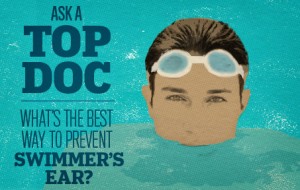Ask a Top Doctor: How Can I Prevent Swimmer’s Ear?
Whip Up an At-Home Remedy
You don’t have to pay big bucks for OTC prevention drops, says Dr. Carroll, who recommends this three-pronged attack on bacteria instead: Fill a 2-ounce dropper bottle with 1/3 rubbing alcohol, 1/3 hydrogen peroxide, and 1/3 vinegar — the alcohol dries out the ear canal and the peroxide and vinegar kills bacteria.
Place three to four drops in each ear after a swim and again at night on days you’ve been underwater. Just make sure to make a new batch often, as the mixture breaks down and won’t be as effective after a week or two. If you don’t have all three ingredients on hand, Dr. Carroll says that you can also use four to five drops of rubbing alcohol in each ear — it will at least dry out the ear canal and take away bacteria’s happy climate.
Ditch Your Obsessive Q-Tip Habit
“Leave ear wax alone,” says Carroll, who stresses that the yellow gunk you try so hard to avoid actually serves as the ear’s defense system by fighting bacteria and repelling water. “Swimmer’s ear is often caused by too little ear wax or by scratching the ear canal due to excessive Q-Tip use, which makes it susceptible to infection.”
Avoid Grimy-Looking Water
If that pool looks like it hasn’t been cleaned lately, don’t dive in — infectious bacteria from contaminated water can seep into the ear canal and cause swimmer’s ear, says Dr. Carroll. He also recommends checking for warning flags on the beach that indicate the water is contaminated.



